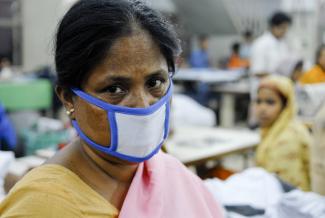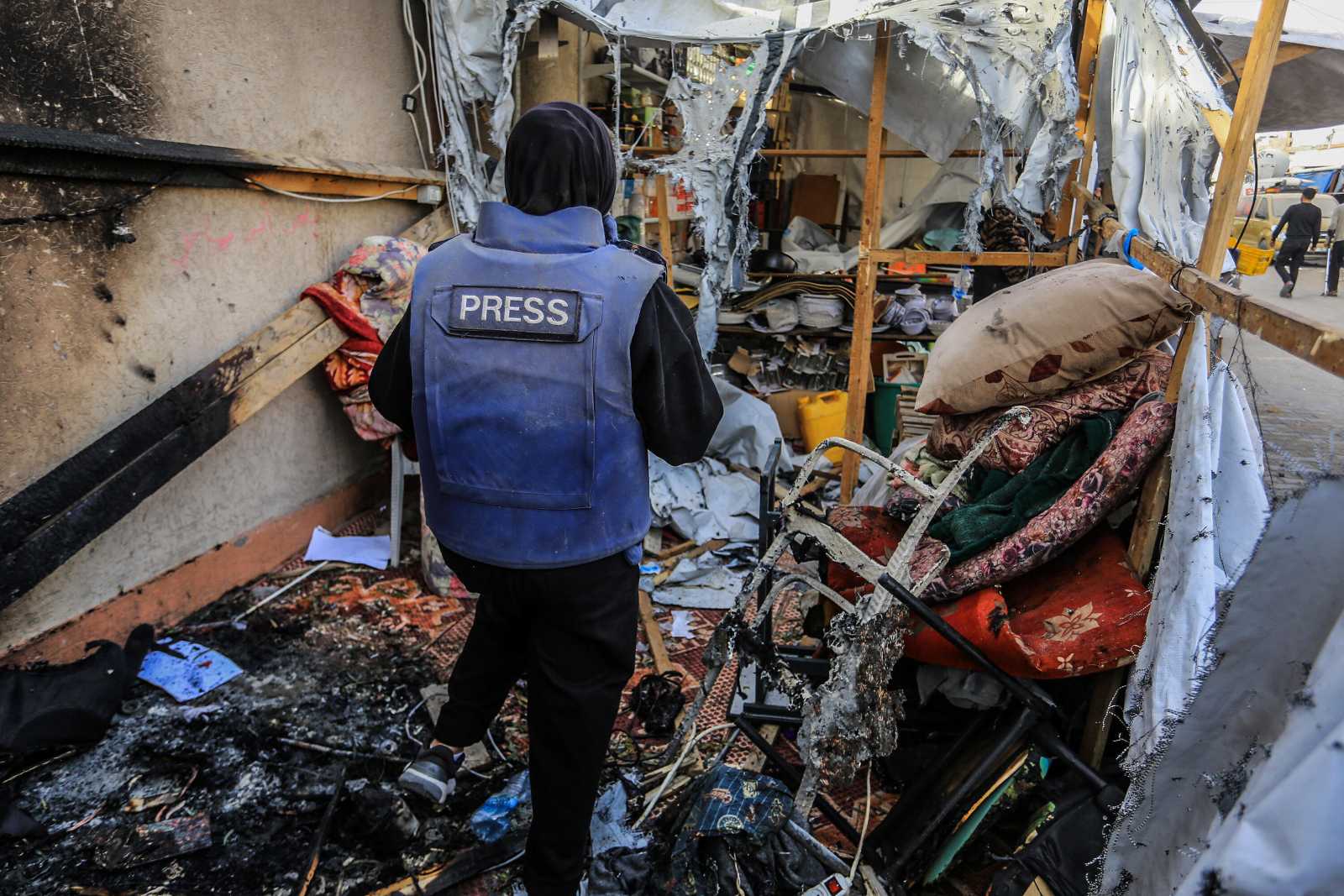Labour relations
“Enforce the law”

You have been in Germany and Europe since the collapse of the Rana Plaza factory building in April 2013. Are people here interested in what things are really like in Bangladesh?
Actually, my experience is mixed. Sometimes, people really want information about what is going on in Bangladesh and want to know my perspective – and then I am very happy that I can share so much information. But sometimes I find European experts talking a lot about the Bangladesh garment industry in theory with only little practical experience in my country. That is frustrating because we know what we need; we know what needs to be done! If Europeans or Americans try to do something that suits their own ideas even though they do not understand our reality, things will not work out. There have been so many meetings, with the same things being said over and over again. It makes me feel bad that it doesn’t lead to any new action plan. We should focus on what is good for the workers.
But demands are increasingly made to require western companies to certify working and environmental conditions all along the garment supply chain. Won’t that help?
The supply chain is very complex and goes through many countries. I do not believe that more audits and more inspectors will solve our problems. Lots of auditing firms are already earning good money this way. And Bangladeshi companies are spending a lot of money to meet the requirements for various labels and certifications.
Campaigns against individual western brands and retailers have not worked either.
No, they have not. Many times I was asked to come to Europe or America to campaign against a specific Western company or brand, but I always refused to do so because it doesn’t help the workers. Often buyers shift their business to other suppliers when poor working conditions are exposed in a specific factory – and that means that workers lose their jobs. In other cases, western buyers used the bad publicity to push down prices even further in negotiations with a factory, and working conditions got even worse. Targeting individual retailers helps neither the industry nor the workers. Many times, campaigns focus on discounters, but this is not fair. Consider who was sourcing clothing from Tazreen and Rana Plaza: low-prices discounters were involved, but so were European high fashion brands. Sometimes it seems to me that these campaigns help multinational companies increase the level of exploitation. The problem is that no one addresses the concrete needs of the garment workers.
So what needs to be done?
Our labour law is actually quite good, but implementation is poor. So the real issue is to ensure effective implementation. We respect the local law and we respect the ILO conventions that the Government of Bangladesh has ratified. We don’t need other rules. If you really want to help Bangladeshi workers, respect the local legislation and insist that it be implemented. Why do we have to focus so much on international standards? Internationally, most people work five days a week. But in our country, six days are normal. This is what our law says. It is also what workers accept. You must respect our local laws. Our law defines overtime calculations, maternity benefits, child-care requirements and other things. These things must be implemented – but all too often, they are not.
What about wages? Activists in western countries want them to rise.
Yes, wages are very low in Bangladesh, but calling for a living wage as defined by westerners will not help! Our wages are set through negotiation between the government, entrepreneurs and local labour unions, and this is how it should be. I myself was on the wage board that negotiated the wage increase in 2006. The wage, in itself, is not the big problem. The problem is that if the wage is increased today, tomorrow the rent and other daily expenses will rise. The middlemen, the landlords, grocery shop men, fabric men will immediately raise prices if the minimum wage is increased. So wage increases as such do not benefit the workers much.
Why does inflation erode wage increases so fast?
Millions of workers have come to Dhaka and Chittagong from the rural areas, and there is a terrible shortage of housing, sanitary facilities, health care, child care and other things. Those who get a little more money are willing to spend it, and when the wage rises, everybody is spending more. But the supply of things people need is not growing. Manufacturers have set up the factories, but no one is building dormitories or expanding health-care facilities. Hygienic conditions are terrible; there is no sanitation or safe drinking water. There is no child care. Young women must send their children to the countryside, to their mothers or sisters, meaning that babies cannot be breastfed and the mothers are depressed. There are not nearly enough good public schools. These are the things that need to be addressed for the workers.
Who should address these problems?
We don’t need outside pressure to pay a living wage or obtain foreign certifications! We need cooperation on an action plan to aid workers at the grassroots level. Lots of aid goes to Bangladesh, lots even to the garments sector – it should directly benefit the workers by providing housing, dormitories, health care, sanitation and education for the children of garment workers. Our government cannot deal with these problems alone. The brands and the manufacturers should also contribute through their corporate social responsibility activities. These problems must be addressed in public-private partnerships.
Please give an example.
There is huge demand for child care. Our labour law actually requires a factory with over 40 female workers to offer child care. Today, many large and good factories have a child care room with equipment – so they pass the audits. But the truth is that they do not provide child care. We need public-private partnerships to solve this problem. The government needs to enforce the law; the local and international companies need to provide the funds to run a child-care facility, either in the factory or in the community; and the labour unions that are active in the company need to monitor the situation and make sure it is actually happening.
What is the situation for labour unions in the post-Rana Plaza environment?
There has been some progress. The Accord on Fire and Building Safety in Bangladesh, a far-reaching, historical agreement between companies and international and local labour unions, has resulted in the inspection of over 1,700 factories in Bangladesh. Local union members and solidarity activists often participated in the inspections, and they will continue to monitor the repairs. This approach is strengthening the position of the labour unions in the factories. Well over 200 factories have been unionised since Rana Plaza. This is a very significant positive change. Many workers now have some form of dialogue and collective bargaining with factory managers through the union people. This is a good sign. People have become more conscious of labour issues and realise that there needs to be dialogue between management and workers. However, we still have lots of problems. Some union leaders have lost their jobs, there has been abuse of union leaders, and also false cases have been filed against them.
You started work in a garment factory about 30 years ago and you have been a labour activist for the last 25 years. How has the situation for women garment workers changed over the decades?
When I started working in the factory where my mother was also working, they treated the workers so badly! There was so much abuse of women – verbal abuse, physical abuse, sexual abuse. This is no longer a major concern. There is also a lot less overtime now. Previously, nobody followed and respected the law. Seven days a week, working until midnight was common. Compared to that situation, we have improved a lot. The average garment worker now works 10 hours a day, six days a week. Most of the factories work 10 hours; sometimes it is 12 hours. 14 hours has become very rare. Today, maybe 70 % of the factories pay maternity leave and respect the needs of pregnant women. At the beginning, nobody did.
Why have things improved?
Because of increased workers’ awareness and legal support of the workers. Workers have raised their voice and demanded their rights. This is how things have changed. Today Bangladeshi women are very proud of their independence as working women, their ability to earn money and contribute to their family’s income and to the country’s economy. We need this industry, but we are also insisting that our rights as workers be respected.
Nazma Akter
is the founder and executive director of the AWAJ Foundation, which defends workers’ rights in Bangladesh. “Awaj” means “voice” in Bengali.
awaj@dhaka.net







